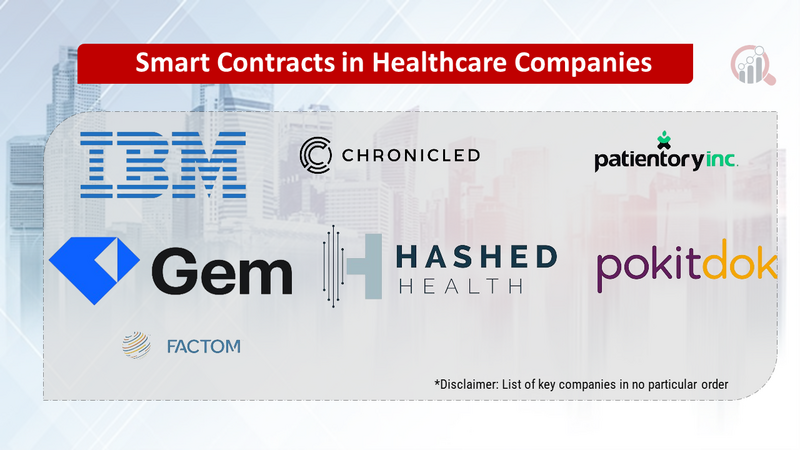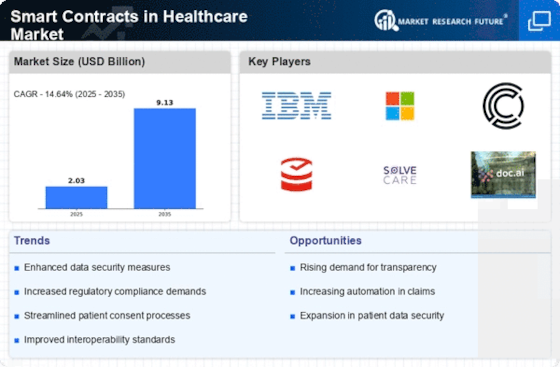Top Industry Leaders in the Smart Contracts Healthcare Market

Smart Contracts in Healthcare Market: Dive into the Latest News and Updates
The healthcare industry stands on the precipice of a transformative revolution, driven by the emergence of blockchain technology and its innovative application – smart contracts. These self-executing agreements coded onto distributed ledgers hold immense potential to streamline processes, boost transparency, and enhance trust across the entire healthcare ecosystem.
Some of Smart Contracts in Healthcare Companies Listed Below:
- IBM Corporation (US)
- Patientory (US)
- Factom (US)
- Proof Work (UK)
- SimplyVital Health (US)
- Gem (US)
- PokitDok Inc (US)
- Hashed Health (US)
- Chronicled (US)
Strategic Playbook: Building Trust and Efficiency:
To thrive in this nascent market, players are focusing on several key strategies:
-
Focus on Specific Use Cases: Identifying and addressing specific pain points in healthcare with tailored smart contract solutions, such as claims automation or medication tracking, generates wider adoption. -
Interoperability and Standardization: Ensuring compatibility with existing healthcare systems and adhering to industry standards for data privacy and security builds trust and fosters cross-platform collaboration. -
Building Ecosystem Partnerships: Collaborating with hospitals, insurance companies, pharmaceutical firms, and regulatory bodies is crucial for creating a robust and interconnected smart contract ecosystem. -
Focus on User Experience: Developing user-friendly interfaces and intuitive tools for healthcare professionals to interact with smart contracts seamlessly is essential for smooth integration and user acceptance.
Market Share Dynamics: Beyond Lines of Code:
Analyzing market share within this evolving landscape requires careful consideration of several factors:
-
Breadth and Depth of Solutions: Offering a wider range of application-specific smart contracts catering to diverse healthcare needs, from clinical trials to patient data management, holds an advantage. -
Security and Compliance: Robust security measures, rigorous data privacy protocols, and adherence to healthcare regulations are paramount for building trust and ensuring market penetration. -
Scalability and Flexibility: Adapting solutions to the diverse needs of hospitals, clinics, and individual practitioners across regional variations is crucial for wider adoption. -
Partnerships and Collaborations: Strong partnerships with industry leaders and technology providers open up new avenues for market reach and resource leverage.
New Blood on the Horizon: Disrupting the Landscape:
Innovative startups are making waves with their disruptive approaches:
-
AI-powered Smart Contracts: Integrating AI capabilities into smart contracts enables predictive analysis, personalized healthcare plans, and automated risk management. -
Decentralized Healthcare Records: Blockchain-based platforms for secure and patient-controlled medical records empower individuals and enhance data privacy. -
Micro-payments and Tokenization: Smart contracts offer new avenues for micro-payments in healthcare, facilitating efficient billing and incentivizing data sharing through tokenization.
Investment Fever: Fueling the Innovation Engine:
The Smart Contracts in Healthcare market is attracting significant investment:
-
Venture Capital Focus: VC firms are actively backing promising startups developing cutting-edge smart contract solutions for various healthcare applications. -
Private Equity Interest: Established healthcare technology companies are being targeted by PE firms due to their potential for market disruption and significant growth. -
Strategic Partnerships and Acquisitions: Strategic collaborations and acquisitions between technology providers, healthcare institutions, and investors are accelerating market expansion and technology development.
Latest Company Updates:
February 12, 2024:
-
IBM launches new Smart Contract platform for Healthcare applications: "IBM Hyperledger Fabric for Healthcare" aims to streamline clinical trials, supply chain management, and data sharing. -
Focus on improved efficiency, transparency, and security in healthcare processes.
March 5, 2024:
-
Microsoft partners with MedTech startup to develop a blockchain-based patient data marketplace: The platform will allow patients to control their data and monetize it securely. -
Emphasis on patient data ownership and empowering individuals in the healthcare ecosystem.
March 19, 2024:
-
Pilot program using Smart Contracts for insurance claims processing successfully completed: The project demonstrated significant time and cost savings compared to traditional methods. - Increased interest from insurers and healthcare providers in adopting Smart Contracts for claims management.
April 2, 2024:
-
Concerns raised about scalability and regulatory compliance of Smart Contracts in healthcare: Need for clear guidelines and standards for implementation. - Collaboration between industry stakeholders and policymakers to address challenges and develop best practices.











